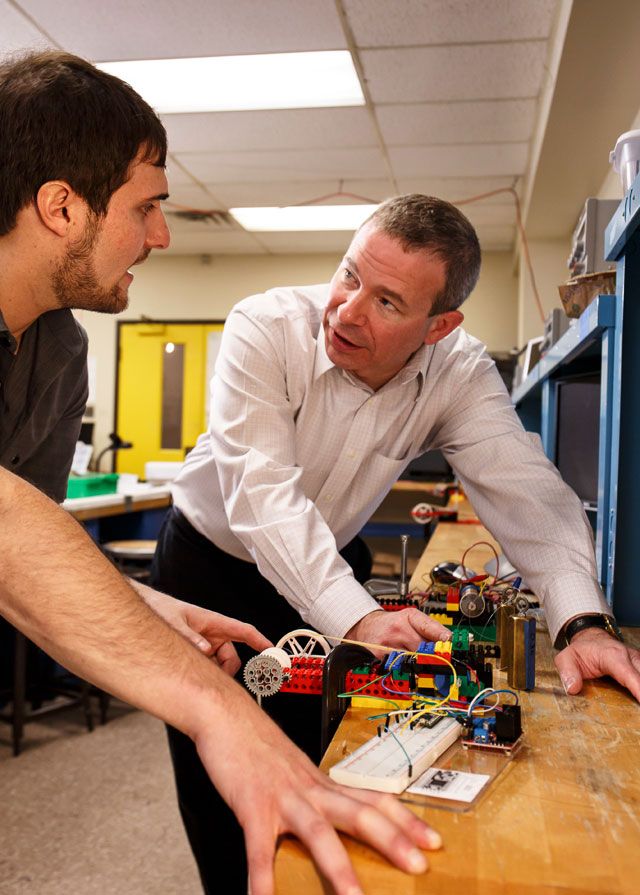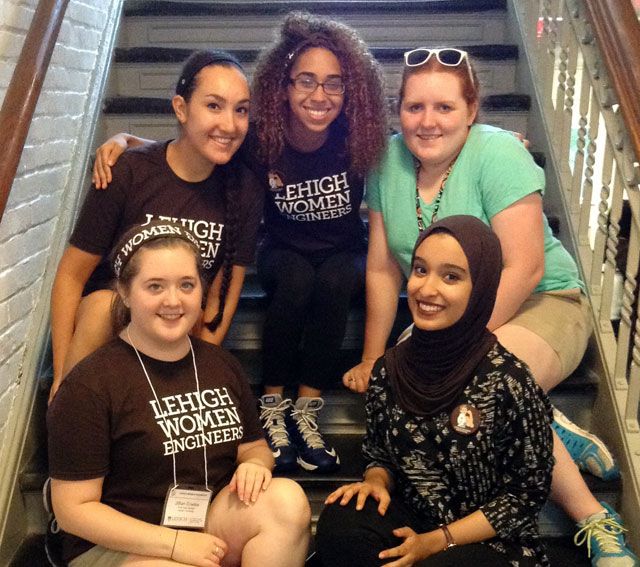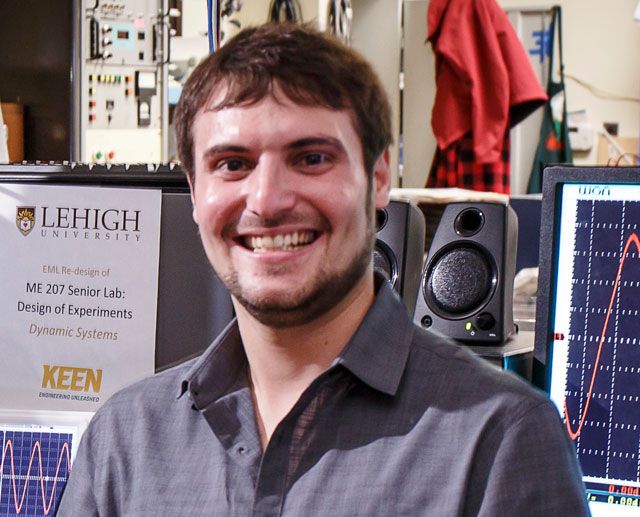Ed Webb, an associate professor of mechanical engineering and mechanics at Lehigh, was dismayed as he reviewed the student reactions to the first project in his Strength and Materials class in 2015.
“One student said ‘I felt I learned little except how to be frustrated over a computer code.’ They hated it.”
Soon after, Webb attended a workshop on “Integrating the Curriculum with Entrepreneurial Mindset,” hosted by Lawrence Technological University through the Kern Entrepreneurial Engineering Network (KEEN). Inspired to find ways to spark his students’ creativity and engagement, he challenged the next semester’s class with an open-ended project: design a treehouse for a charmingly eccentric ‘Aunt Ada.’
KEEN, an initiative of The Kern Family Foundation, is a collaboration of colleges and universities dedicated to developing an entrepreneurial mindset in engineering students. In Webb’s class, the real-world approach he built into the assignment yielded, along with plans for a fully functioning treehouse, a design for an elevator within a hollow trunk, ways to use locally sourced materials to meet sustainability goals, information on the average heights of trees commonly found in the Poconos so the treehouse wouldn’t tower above the forest, and a walk-out porch placed with the detonation heights for various classes of fireworks in mind, so Aunt Ada could see a nearby fireworks display every July 4th.
“They blew the project out of the water,” recalls Webb. “One student said they wished every professor at Lehigh would adopt this approach.”
The root of the entrepreneurial mindset that KEEN seeks to instill in engineers is summed up by KEEN’s “3C’s,” curiosity, connections and creating value. The idea is to encourage engineers to adopt holistic thinking that challenges conventional ideas and integrates fresh ones. By taking ownership and thinking broadly and creatively about every aspect of projects they work on, engineers have a chance to enrich the lives of the people that their work touches.
“Entrepreneurial engineering takes engineering to the next level,” says Thor Misko, program director and team leader of the Entrepreneurial Engineering Program at The Kern Family Foundation. “We want to combine the entrepreneurial mindset with the engineering skill set. It’s not just about design, we want to empower engineers to identify new opportunities and make an impact.”
John Ochs is working to implement the KEEN tenets throughout Lehigh’s engineering program. Ochs, a professor of mechanical engineering and mechanics and director of the university’s Technical Entrepreneurship capstone course, was at the table to help shape KEEN’s mission when it was launched just over a decade ago. He serves as the point person on campus now that Lehigh has joined the network of participating schools.
“We’re leveraging KEEN training to influence the way faculty create their curriculum,” he says. “All undergraduate engineering students should be exposed to KEEN’s entrepreneurial minded learning (EML) techniques and have the chance to incorporate them into their educations and careers. So, we intend to infuse EML in some way into all core courses across every major. At present, some 45 engineering faculty who teach those core courses are employing KEEN principles to develop their own EML modules, and we plan to host further training to grow this over time.”
“We are very broad about how we want this mindset change to occur,” he says. “We are providing a roadmap, and cultivating a community of like-minded faculty who will integrate EML across Lehigh’s engineering landscape.”
Sue Perry, a professor of practice in chemical engineering associated with Lehigh’s Bioengineering program, has been working with faculty on implementing KEEN principles within the program’s undergraduate studies, examining current courses to identify overlap in specific topics between early and advanced undergraduate courses.
“We intend to create a learning continuum so students retain fundamental principles and have context to strengthen their knowledge as they progress,” says Perry. “We are developing modules through which faculty can create context connections in earlier courses, and give students the tools to think progressively about topics as they follow the curriculum.”
“For example,” she says, “we are using the human cardiovascular system as a way to create context across the portion of our curriculum dedicated to fluid dynamics. In sophomore level classes, we’ll be introducing the concepts of biomaterials and biomechanics by having students design and 3D print artificial heart valves in one class, then test them for function and output in the next. Our Junior year fluids course examines the principles of fluid dynamics of the cardiovascular system—and by that point, students will have context for the theory we’re presenting, and will be prepared to think more deeply about how they can apply their knowledge.”
“If we can use active, project-based learning to create connections,” she continues, “we also create a greater depth of understanding from start to finish in the curriculum.”
“The KEEN program is transformational to the entire college and its curriculum,” says Greg Tonkay, associate dean of academics affairs and associate professor of industrial and systems engineering. “It’s empowering our students and supporting faculty teams that are making things happen.”
The new principles flip traditional pedagogical goals, and how those goals will eventually be measured. “We are moving from assessing faculty teaching to assessing student learning,” says Ochs. “And when you get students involved in this active, collaborative learning, the whole classroom comes alive. You have to see it happen, and when you do, it makes a believer out of you.”
In an important sense, the KEEN principles go to the root of what an engineering education is all about: What constitutes a fulfilling life? “The underlying tone of KEEN is about human flourishing. Our mission is to create personal and societal value through a lifetime of meaningful work,” says Misko.
One innovation of the KEEN implementation at Lehigh has been teaming up faculty and students to work together in developing programs and activities. “Lehigh is one of the few schools in KEEN to use a co-development model, and we are encouraging others in the Network to try it because student insight is so valuable,” Tonkay reports. “We have also included facets of the KEEN experience into our PreLUsion program for women engineers, a pre-first-semester initiative that allows students to get a jumpstart on their first year at Lehigh.”
Matt Bilsky ’12 ’14G ’17 Ph.D., a postdoctoral researcher and adjunct professor at Lehigh, modified the KEEN-inspired curricula he’d developed for a mechanical engineering lab course for use with the PreLUsion program.
“I talk to a lot of students about the Lehigh style, and how it is both real world and adaptable,” he reports. “It’s about how to learn. This is the true value of a Lehigh education, and KEEN enhances it. I would love to be an undergraduate now.”
“And that,” replies Ochs, “is precisely how we want every one of our faculty members to feel.”
Story by Chris Quirk



